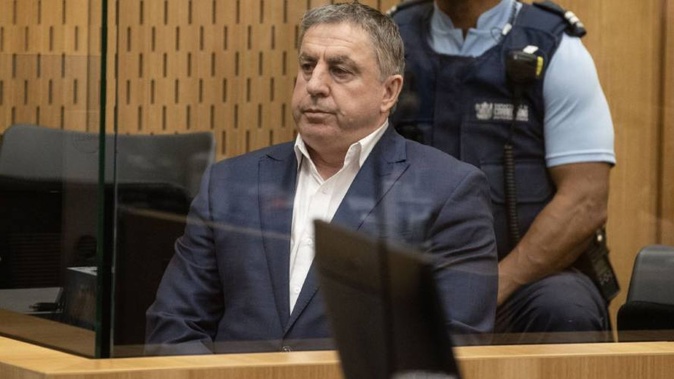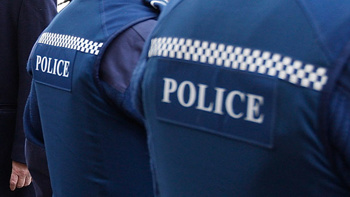
A former prison guard has been found guilty today of murdering his childhood friend Michael McGrath and now faces a life sentence in prison.
David Benbow, 54, denied killing Michael McGrath in the Christchurch suburb of Halswell in 2017.
Today, after 18 hours of deliberations, the jury returned a guilty verdict at the High Court in Christchurch.
Benbow’s mother let out a loud gasp before uttering “no”.
The Crown alleged Benbow murdered the 49-year-old after finding out he was in a relationship with his partner of 17 years Joanna Green.
/cloudfront-ap-southeast-2.images.arcpublishing.com/nzme/PZ3LLW2AXVDTBJXX3MJHPFTEWM.jpg)
21082023 Photo: Iain McGregor/The Press David Benbow is escorted into the dock. The retrial of David Charles Benbow in the High Court in Christchurch. The former Corrections officer is accused of murdering his childhood friend Michael McGrath.
McGrath was supposed to visit Benbow about 9am on May 22, 2017, to help him move some railway sleepers. Benbow said he never showed up, however, the Crown said the sleepers were a “ruse” and that once he arrived Benbow killed him with his .22 rifle and later disposed of his body. McGrath’s body and the firearm have never been found.
Meanwhile, the defence said McGrath never showed up and that Benbow was in no better position than anyone to say what happened to him.
Benbow pleaded not guilty during a seven-week trial at the High Court in Christchurch earlier this year. No verdict was reached.
- No body, no weapon murder case: New jury to be selected
- No body, no gun: Hung jury in Christchurch murder case
- Murder trial witness' mistake shows 'entire premise' of Crown case flawed, defence says
A re-trial began in August. On Monday, the jury retired to consider its verdict and returned its verdict at midday.
McGrath’s brother, Simon this afternoon said the family was “elated” with the verdict.
/cloudfront-ap-southeast-2.images.arcpublishing.com/nzme/5HBTRHEFUBH6TDNH7J5MGIDVXI.jpg)
Detective Inspector Kylie Schaare and Michael McGrath's brother Simon leaving court after the verdict today. Photo / George heard
“This is the right verdict,” he said.
“It’s been just over six years since Michael’s disappearance and today’s guilty verdict is welcomed by the McGrath family and friends of Michael.
“It is without doubt a hugely bittersweet moment. Michael was a meticulous and talented builder who was hugely loyal, humble, and unassuming - he is sorely missed.
“Michael has been taken away from us in the most cowardly, premeditated, and murderous manner. The horrific nature, trauma, and legacy of this despicable act will haunt the family for the rest of our lives.”
/cloudfront-ap-southeast-2.images.arcpublishing.com/nzme/E4UUK4A36BF3NCMC6IB3BGSG4U.jpg)
Police and McGrath's family spoke outside court after the verdict today. Photo / George Heard
The McGrath family thanked the police for their “care, professionalism, ongoing commitment, and tenacity” during the investigation. They also thanked the Crown prosecutors involved in the case.
Asked how it felt to hear the verdict, Simon McGrath said it was “hugely emotional”.
“I’ve never felt anything like it. It’s been one hell of a ride over the last six years and I’m just elated,” he said.
“It’s a just verdict.”
He wanted to ask Benbow where his brother was.
/cloudfront-ap-southeast-2.images.arcpublishing.com/nzme/KQYC5Y7S3RHXJCFLJFORQBZ6B4.jpg)
Simon McGrath speaks outside court today. Photo / George Heard
Detective Inspector Kylie Schaare said police acknowledged the guilty verdict handed down today.
“I would like to acknowledge and thank Michael McGrath’s family and those close to him, who have conducted themselves with so much dignity and grace through what has been the worst time of their lives,” she said.
“They have had to endure the stress of a long investigation, two trials and having their loved one and their own lives laid bare in a courtroom.
“We knew that no outcome today could make up for the grief and loss they have endured, as nothing brings Michael back.
“My one hope is that they can now move forward in starting to process their grief and the loss of their son, brother, partner, and friend.
“My one enduring wish is that we could have returned Michael to his family.”
Schaare also acknowledged the police investigation team who have “worked tirelessly during the past six years to find answers for Michael’s loved ones”.
“This investigation has been a massive undertaking and I give particular thanks to the police trial team and the Crown Solicitors, who have spent many weeks away from their own families during the investigation and this trial and have been so committed and professional throughout.”
/cloudfront-ap-southeast-2.images.arcpublishing.com/nzme/AIEGNWZLMVAUTJYQLN5R3UAFSM.jpg)
Christchurch builder Michael Craig McGrath, 49, was last seen at his home in Halswell, Christchurch, in May 2017.
Last Wednesday, Crown prosecutor Barnaby Hawes gave his closing address to the jury.
He began by saying the Crown acknowledged it was a circumstantial case, with no body to examine, no murder weapon, no DNA and no confessions.
However, he said the case against Benbow was “compelling and it’s decisive”.
/cloudfront-ap-southeast-2.images.arcpublishing.com/nzme/CJE3ZPFEUJESTF4TH2EULCNV5I.jpg)
Crown prosecutors Claire Boshier (left) and Barnaby Hawes. Photo / Iain McGregor
A week before McGrath disappeared, Benbow turned up at his Checketts Ave home three times, first to ask for assistance in moving items around his section, then to invite him for dinner, and then on May 21, to make an appointment for McGrath to visit him at 9am on May 22 to move some railway sleepers.
Benbow would later say McGrath never showed up at his home that morning. However, Hawes cited witnesses who spoke at the trial who said “he was a man who would do what he said he was going to do”.
/cloudfront-ap-southeast-2.images.arcpublishing.com/nzme/2UCM3XB7Z5AYZIV4VOUYCULU3I.jpg)
David Benbow has been found guilty. Photo / Iain McGregor
He asked the jury to “think long and hard” about Benbow’s missing .22 rifle.
“A firearm is not like a different type of lethal weapon. It comes with specific legal obligations. He had one firearm, according to those who knew him he was conscientious about it, this cannot simply be brushed over... there is no adequate explanation as to what might’ve happened to that firearm other than Mr Benbow disposed of it himself.”
He said it was not the Crown’s case that this was the “perfect murder”.
/cloudfront-ap-southeast-2.images.arcpublishing.com/nzme/ZJLPPVFGTFCOBGCRF46R47Z7IY.jpg)
Justice Jonathan Eaton. Photo / Iain McGregor
“Mr Benbow is a careful and deliberate man but everyone makes mistakes … He’s hidden his body well and utilised an outdoor scene to his advantage, kept things very simple and spoken to nobody about it. Nevertheless, I suggest the facts speak for themselves and prove murder beyond reasonable doubt.”
To find the charge of murder proven, the Crown needed to prove five fundamental matters, Hawes said - that McGrath is dead, that he did not take his life, he had not died in an accident, that Benbow caused his death and that he intended to kill McGrath.
Hawes said McGrath’s disappearance was not explained by anything other than foul play.
/cloudfront-ap-southeast-2.images.arcpublishing.com/nzme/JZOTTZJHD5G3ROA5CSWJUI3FU4.jpg)
David Benbow's lead defence lawyer Kirsten Gray. Photo / Iain McGregor
Benbow’s lead defence counsel, Kirsten Gray, then closed their case to the jury.
Gray said the Crown’s case was based on a “theory.
“A theory that was first thought up by Joanna Green, the theory that Mr Benbow had done something to Mr McGrath. And it’s a theory that is desperately searching for evidence,” she said.
“In this case, you’re not here to solve the disappearance of Mr McGrath. You are here to determine beyond reasonable doubt whether or not the Crown has proven its case against Mr Benbow.”
Gray referred to the Crown suggesting the case was like strands of a rope, that once they come together make a rope so strong that you can rely on it beyond reasonable doubt.
“Be very cautious about that submission. If you look at the strands of the rope in detail you might be left scratching your head. The strength of the rope members of the jury is your domain, it’s for you to decide. But you need to ask yourselves at the outset do you accept that this is a rope, or as I suggest is it just a pile of tattered threads, a house of cards not capable of withstanding any serious probing.”
She said the jury had more evidence that police focused only on Benbow than evidence of anything else, citing the 8000 hours they spent searching a dump compared with the 800 hours looking for McGrath.
“This doesn’t amount to a rope and it certainly doesn’t get you to the high standard of beyond reasonable doubt.
“In my submission, the Crown case is a house of cards built on shakey foundations which if you give it any real probing will simply fall over and if you drill into what is being alleged then things don’t make sense and the improbability of their entire case is glaringly obvious.”
She put the evidence into three categories - evidence of nothing which she called “red flag evidence”, and “lens evidence” that could be viewed either way depending on what lens you look through and actual evidence that the jury could use and rely on.
Gray said there was “very little” in the case that even began to resemble real evidence.
“If you even begin to scratch the surface of this evidence it becomes clear it doesn’t get you anywhere near establishing that Mr Benbow was involved in a homicide.”
She cited the lack of forensic evidence, given the Crown had at least three crime scenes - Benbow’s home, his car and McGrath’s home.
“No blood, no DNA, nothing of any forensic interest.”
Benbow, Gray said, did not have a motive nor the means or opportunity to commit a murder.
To believe Benbow had the capacity to commit the “perfect murder” was “farcical”, she said.
Gray said the police had “tunnel vision”, and worked off a “suspect-driven theory”.
She concluded by telling the jury this was a case with “no body, there is no weapon, absolutely nothing of forensic evidence implicating Mr Benbow.”
Sam Sherwood is a Christchurch-based reporter who covers crime. He is a senior journalist who joined the Herald in 2022, and has worked as a journalist for 10 years.
Take your Radio, Podcasts and Music with you









